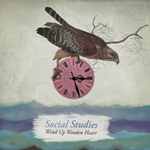|
|
 |
Dusted Reviews
Artist: Social Studies Album: Wind Up Wooden Heart Label: Antenna Farm Review date: Jul. 26, 2010 |

|
|
|
 |
The One A.M. Radio’s simple, head-nodding remix of “Time Bandit” brings into relief what Social Studies songs tend to lack: direction, momentum, the unifying masterstroke. Like most of the tracks on Wind Up Wooden Heart, the San Francisco quartet’s first full-length, the original goosesteps its way through a less-than-linear series of verses and choruses and bridges, this one with a whirring synth breakdown and a leftfield pseudo-resolution. The remix trims out the majority of these, plus a good deal of the song’s nuance, but it also eliminates the irksome sense that the song was never entirely finished.
Though surely not accidental, the piecemeal nature of Social Studies’ songs treads a thin line between “structurally inventive” and, well, all over the place. The songs Mates of State wrote before their great leap forward, rickety collections of as many themes as the track can fit before it topples, feel much like these do. In neither case are the themes totally unrelated to one another, but the attention needed to locate their connections is disproportionate to the rewards of the whole piece. Wind Up Wooden Heart doesn’t spend much time invested in a passage without gearing up for the next; the parts are slow to coalesce, and sticking with them is often no better than being stuck with them. (The fast-forward trick doesn’t work, because wherever you land is likely to be unfamiliar.)
The album does not lack for pleasing miniature moments, nor for variety of moods; most tracks wind up, either eventually or prematurely, at a satisfying instrumental breakdown — but it rarely feels like a natural outgrowth of the song around it. The end of “Run With Fever” bears no resemblance to “Run With Fever”; the highlights of “Trapdoor Spider” and “We Choose Our Own Adventures” are, at least according to the way those songs are laid out, digressions.
The main-feature parts, meanwhile, are buoyed by Natalia Rogovin’s eloquent keen (uncannily similar to that of Camera Obscura’s Tracyanne Campbell, with hints of Karen O) and knack for quotable, if not stirring, lyrical repetitions: “so many battles left to go” or “we’re still alive / we’re not waiting to die.” When she’s on, though, the band behind her sounds chaste, polite, neutered — as though recognizing that hers was meant to be a laptop-pop project and theirs something else, something that hasn’t quite found its bearings yet. Both show promise, but the indecisive push-pull between them leaves a set of songs that are likeable, no more, in the place of what might have been actual personality.
By Daniel Levin Becker
|







